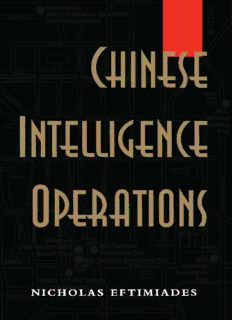
Chinese Intelligence Operations: Espionage Damage Assessment Branch, US Defence Intelligence Agency PDF
Preview Chinese Intelligence Operations: Espionage Damage Assessment Branch, US Defence Intelligence Agency
Chinese Intelligence Operations CHINESE INTELLIE N C E ΟΡERATIONS NICHO LAS EFTIM IADES NAVAL INSTITUTE PRESS Annapolis, Maryland First published in 1994 in Great Britain by FRANK CASS & CO. LTD. Newbury House, 900 Eastern Avenue, Newbury Park, Ilford, Essex IG2 7HH, England This Paperback Edition Published in 1995 by Toppan Company, Limited, Tokyo, Japan, For Sale in Singapore, Malaysia, Brunei, Indonesia, Thailand, Burma, Vietnam, Cambodia, Hong Kong, Taiwan and Korea. Copyright © 1994 Nicholas Eftimiades British Library Cataloguing in Publication Data A catalogue record for this book is available from the British Library ISBN 0 7146 4588 5/TIE 1198 The views expressed in this study are those of the author and should not be construed as representing positions of the Depart ment of Defense or the U.S. government. All rights reserved. No part of this publication may be reproduced in any , form or by any means, electronic mechanical, photocopying, recording or otherwise, without the prior permission of the publisher. Printed and bound by Antony Rowe Ltd, Eastbourne Transferred to digital printing 2005 In memory of Dr. George S. Eftimiades, who taught me about freedom and hard work, and Harold C. Hinton, Ph.D., George Washington University, who inspired me to be a sinologist Contents Foreword, ix Acknowledgments, xi Glossary, χιιι PART ONE Introduction, i 1. China’s Use of Intelligence, 3 2. Framework for Analysis, 9 3. China’s Information Objectives, 12 PART TWO Ministry of State Security, 15 4. Organizational Structure, 17 5. Foreign Operations, 27 6. Domestic Operations, 44 7. Agent Recruitment Methods, 57 PART THREE China’s Intelligence Community, 73 8. Military Intelligence Department, 75 9. Departmental Structure, 78 10. Military Intelligence Operations, 90 11. Secondary Intelligence Organizations, 103 PART FOUR Conclusion, 111 12. Future Prospects, 113 Appendixes, 117 Notes, 141 Select Bibliography, 153 Index, 163 VII Foreword Confucius, the moralist and teacher of unsurpassed influence in China for millennia, said, “Confronting a foreign invasion, one should resort to deception, which may suffice in repelling the enemy. ” Yet when his Western counterpart Socrates advocates wile and guile in the name of national security, we are not sure how to respond. This professed emphasis on covert operations—unfettered, to West- ern eyes, by any ethical constraints—is distinctly Chinese, with deep historical roots. In Chinese statecraft the use of spies is not incom- patible with higher principles. Indeed, in his Art of War Sun Tzu gives top priority to the employment of espionage for humanitarian rea- sons, among others: in war, lack of the “foreknowledge” supplied by secret agents would “entail heavy loss on the people.” In light of China’s past one begins to understand the relentless endeavors of the PRC government in pursuing its intelligence objectives, aided by a vast network of chameleonic agents abroad and penetrative bureau- cracies at home. Chinese government and society construe the notion of intelligence in the broadest possible sense. Nicholas Eftimiades’s remarkable sensitivity to China’s strategic tradition sets his book apart from its competitors in this rapidly ex- panding field. Adroitly avoiding the pitfall of mirror-imaging, he provides a nuanced, systematic, and in-depth examination of the ex- tensive modern-day Chinese intelligence machine and discusses a wide range of policy-related issues of rising importance. The tone of the book reflects not only insight into the past but also a keen awareness of the present and the future. Eftimiades has actively explored valuable sources newly made available by the increasing permeability of Chinese society, enabling him to assess the strengths and weaknesses of China’s intelligence services beyond the confines of conventional wisdom. In addition, a delightful writing style unexpectedly accom- panies the thoroughness of a rigorous analyst and the serious nature IX
Description: